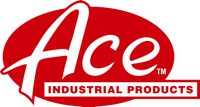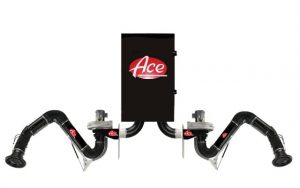73-501
How close should my fume extractor’s hood be to the welding arc?
Welding fume extraction hoods should be placed close enough to the welding arc to be effective, yet not so close as to distrub shielding gases or obstruct the welders line of vision. We call the optimal distance from the arc the sweet spot, and the sweet spot is determined by placing the edge of the […]
Why should I use a fume extractor instead of wearing a respirator?
The short answer is that a respirator protects the welder wearing it, but does nothing for nearby workers not wearing similar protection. The somewhat longer answer is that a repirator, as good as they are in protecting the person wearing one, does not capture and contain weld fumes in the general atmosphere. As such, other […]
Why should I use a fume extractor instead of placing fans in my shop to blow the fumes away from my welders?
The practice of using fans and blowers in this manner is called the dilution method, and while it is commonly used, this method may not be effective in removing weld fumes in any except the smallest of shops. Disadvantages include lack of uniformity in diluting the fumes throughout the shop, downstream concentration of fumes as […]
If I were to exhaust welding fumes outdoors through an Ace wall mounted arm and blower, can I retrofit the components to a filtration system should this method become prohibited?
Yes, the Ace stationary system is designed to accommodate such a change in regulations, so you can purchase and install Ace wall mounted arms and blowers with the assurance that you can convert to a filtration system without dismantling your current system. Ask your Ace dealer for more information.
Aren’t used filters considered Hazardous Materials?
There are currently no “blanket” regulations prohibiting the placement of used filters into standard trash receptacles. Local authorities, however, may place certain restrictions on this procedure, so we advise checking with applicable agencies to ensure conformance with regulations
How do I dispose of used filters?
Used filters can be easily removed from Ace extractors. We recommend the operator wearing gloves and protective eyewear, placing the removed filters into a trashbag, sealing the bag, and placing the bag in a trash receptacle.
How long do filters last?
There is no clear answer to this question as too many factors can influence the life of filters, including, but not limited to, welding process, type of materials, condition of materials, run times, position of extraction hood relative to the arc, welder skill level, ambient air movement, humidity, and more. Filter status indicators are included […]
How do I know which filters to use in my extractor?
Ace makes a wide variety of filters available that work in combination to provide the best possible filtration for your work application. Generally speaking, 95% main filters and standard pre-filters provide effective filtration for the vast majority of welding operations. HEPA main filters can be used in place of a 95% filter to provide additional […]
What do the different filter ratings mean? HEPA, MERV, 95%…?
Filters are rated on their efficiency to stop and trap particulate of a particular size. Most filters used in Ace extractors base their efficiency rating on stopping particulate of 5 microns or greater. A micron is 1/25,400th of an inch in diameter, and most carbon steel welding particulate is approximately 5% microns in size. So […]
How do I know which extractor to choose?
There are several factors that determine the best extractor to use, including location, usage, materials, and quantity of smoke/fume produced. In general, however, the rule of thumb is this: Portable extractors are the best choice for jobsite work, maintenance welding, and production benchwork. Mobile extractors and downdraft tables are best suited for continuous production welding […]
73-501 Stationary Fume Extractor System
780-1240 CFM STATIONARY FUME EXTRACTION SYSTEM W/ SINGLE OR DUAL ARMS

